by James Alexander, Jr. | Oct 8, 2021 | Faith & Work, Headline News |
In church, we often hear people make reference to “being a good steward over what God has given us.” But do we really know what that means?
Many would argue that the Bible talks more about money and stewardship than almost anything else. That suggests to us that what God has to say about money is pretty important.
Yes, there are more ways of practicing stewardship than ways that involve money, but money is what people struggle with most. Let’s address God’s posture toward our finances this particular article—we’ll save parts II and III on personal finance tips and church finances for another time.
First, many Christians have an incorrect biblical understanding about money. I can’t tell you how many times I’ve simply mentioned money and a Christian said, “Don’t talk to me about money. You know the Bible says that money is the root of all evil!” Well… no, it doesn’t. First Timothy 6:10 says that “the LOVE of money is the root of all [kinds of] evil.” And that makes a big difference. Money itself isn’t evil. Money is necessary. It’s the love of money that makes people do evil things to acquire more money. Essentially, the Bible is warning us not to make money our idol or god. If Christians spend their time avoiding money conversations, how can we expect to acquire any money or manage the money we have well?
So how does the Bible say we should manage money? Luckily, Jesus gives us a parable (a short story that makes a point) about managing money! But it might not be quite what you realized when you heard it in Sunday School or heard it preached…
Matthew 25:14–30 and Luke 19:12–28 are parables about financial investment that Jesus tells to illustrate what the kingdom of God is like. Yes, you read that right. Jesus tells a story about stewardship and managing currency (fittingly called “talents,” making it translatable to non-monetary gifts as well) to illustrate what God’s rule is like. The stories have some minor differences, so I’ll stick with the more popular version in Matthew 25.
 Briefly, the story goes like this: a man has three people that work for him. (We can call them servants or employees.) He leaves them five talents, two talents, and one talent, respectively, while he travels to another country. (A talent could be interpreted as a way of making money or money itself. For this, let’s just say a talent is worth $10,000.) When he comes back after a long time, the first employee now has ten talents ($100,000), the second has four talents ($40,000), and the last one gives his talent ($10,000) back to his employer. The employer rewards the two servants that made him money, but calls the other one wicked and “cast[s] the unprofitable servant into outer darkness” where it says there’ll be “weeping and gnashing of teeth” (Matthew 25:30, KJV). Yeah… he sends the unprofitable “wicked” servant to (symbolic) hell.
Briefly, the story goes like this: a man has three people that work for him. (We can call them servants or employees.) He leaves them five talents, two talents, and one talent, respectively, while he travels to another country. (A talent could be interpreted as a way of making money or money itself. For this, let’s just say a talent is worth $10,000.) When he comes back after a long time, the first employee now has ten talents ($100,000), the second has four talents ($40,000), and the last one gives his talent ($10,000) back to his employer. The employer rewards the two servants that made him money, but calls the other one wicked and “cast[s] the unprofitable servant into outer darkness” where it says there’ll be “weeping and gnashing of teeth” (Matthew 25:30, KJV). Yeah… he sends the unprofitable “wicked” servant to (symbolic) hell.
Whoa! That’s what the kingdom of God is like? According to Jesus—yep. But let’s unpack what this story is trying to tell us. It’s not saying that if we don’t make money (for God or ourselves), we’re going to hell. It’s something much more subtle and fundamental. So here are the three reasons the employer (who presumably represents God in this parable) is upset and what God is trying to tell us.
1. “Talents” lose value over time unless you grow them.
One of the first things that any good finance class will teach you is the time value of money, which simply means that money today is worth more than the same amount in the future. For some, this concept can be hard to understand, but trust me, it’s true. Money today can be invested sooner and gain more interest, so it is always worth more if used. And that’s before we consider inflation. In telling the story, Jesus is pointing out that the talents/money/earning potential that the master gave the servants was a gift that the master expected to be used for his benefit. (Sound familiar?) Jesus is clearly indicating that humans are God’s servants and that He expects us to use our talents (monetary and non-monetary) to His benefit. (The text doesn’t say “after a long time” he “settled accounts with them” for no reason; it’s symbolic of our lifetimes (Matthew 25:19, NIV).)
2. The servant wastes the talent that the master gave him.
I did say it’s only worth more if used. That’s why the Lord was so upset—the servant didn’t use the talent he was given. That means he not only wasted the talent itself (because it is worth less now than it was when he gave it to him), but also wasted all of that time that he had the talent. Imagine how much that single talent could have grown and been enhanced, but by hiding it instead of using it, he robbed it of its value. Unfortunately, some of us are guilty of doing the same thing with God because, like the servant in the stories, we’re afraid of messing up with the talent we have. This story warns us that the way to really mess up is to hide our talents and money out of fear and not utilize them for God’s glory
3. The servant/employee doesn’t put in any effort.
The biggest tragedy of this parable is that it didn’t have to end up that way for the third servant. The master points out that even if he feared him, hiding his talent (i.e., putting his money under a mattress) was the worst thing he could’ve done with it. He says, “You could have at least put my money in the bank so that it could have gained interest!” (Credit unions are also a great option these days.) This suggestion serves to tell us that even a little growth is better than no growth. Yet for some reason, many Christians think that as long as we present God with what He gave us, we’ll be fine. Not so. If we don’t help grow God’s kingdom, even a little bit, then it is as if He had not given us any gifts or talents to begin with. Putting the money in the bank was something simple that did not take much effort; how often do we not put in the effort to speak with someone about God or to pay our tithes and give our offerings? When we don’t put in the effort required to grow what God has given us, we are being the wicked servant Jesus warned us about.
In conclusion, many Christians erroneously believe that if they had more money, they would do better with it. Others say that when they make more money, they’ll pay their tithes, yet when a raise comes, they simply spend more money and never tithe. Based on the Scripture, if we did a better job of managing the little that we had, not only would we have more as a result of our good stewardship, but God would bless us with more. This is what I believe Jesus means when He says, “For whoever has will be given more … Whoever does not have, even what they have will be taken from them” (Matthew 25:29, NIV). To God, if we don’t put forth the effort to grow a little, then we won’t have the “talent,” skill, or practice needed to manage something greater.
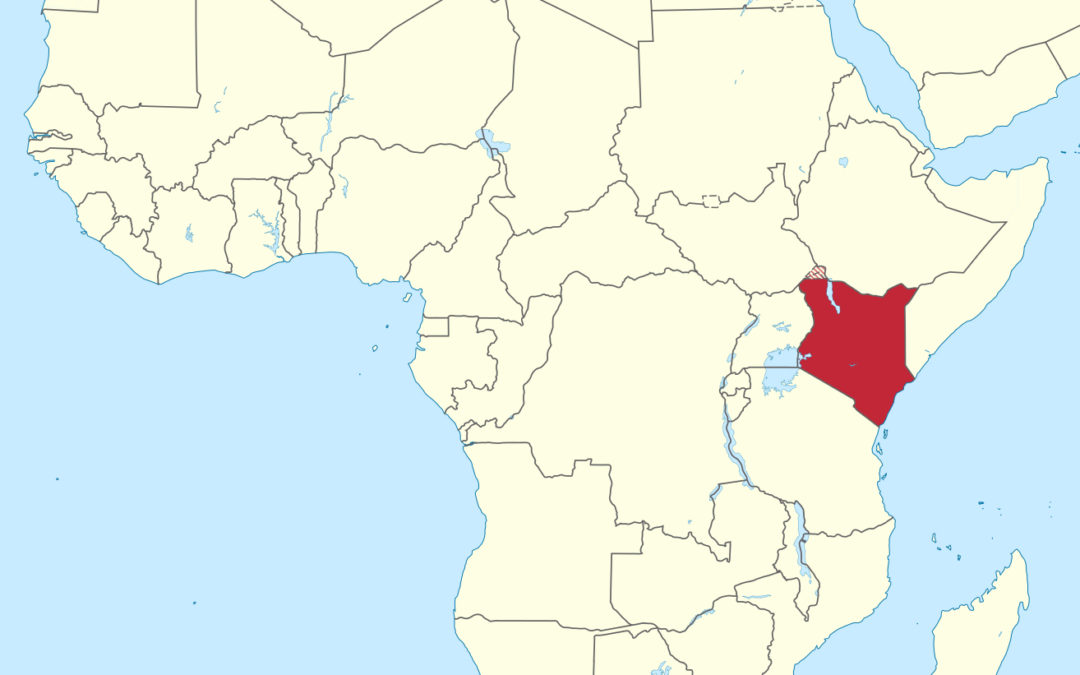
by Fredrick Nzwili, RNS | Sep 23, 2021 | Headline News |
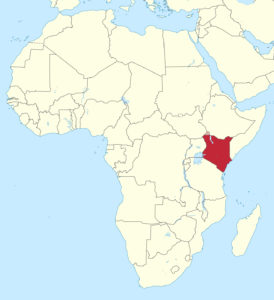
Kenya, in red, located in eastern Africa. Map courtesy of Creative Commons
NAIROBI, Kenya (RNS) — Some churches in Kenya have barred politicians from addressing their congregations, saying campaigning during services disrespects the sanctity of worship.
The national Anglican, Presbyterian and Roman Catholic churches have all issued bans, as many of the politicians begin early stumping for next year’s general elections. The Methodist Church, however, is keeping the church doors open for all.
The Rev. Joseph Ntombura, presiding bishop of the Methodist Church in Kenya, has said his church is not dissenting from the effort but is taking a different approach. The bishop said shutting the doors to politicians would mean discriminating against some of its members.
“The church is for all people,” Ntombura told Religion News Service in a telephone interview. “Human beings are political, so there is nothing wrong with inviting the politicians in church.”
According to the bishop, congregations need to hear the views of politicians on issues of national interest, such as the sharing of resources. In the past, Ntombura said, the church has invited other experts to speak to congregations on important matters, and politicians are no different.
“Some of the politicians are our pastors,” said Ntombura.
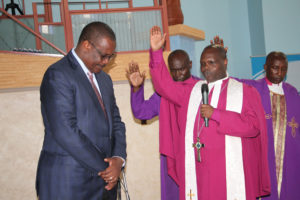
The Rev. Joseph Ntombura, with microphone, presiding Bishop of the Methodist Church in Kenya, prays over former Nairobi Governor Evans Kidero, left, in Nov. 2015. RNS photo by Fredrick Nzwili
Kenya is about 85% Christian. About 33% of that group are Protestants and 20.6% are Catholic. The rest belong to evangelical, Pentecostal and African denominations. Muslims make up 11% of the population.
In issuing the bans on politicking in church, denominations have said they feared that church services would become campaign rallies and that candidates would use language bordering on hate speech in an attempt to win votes or sway the views of congregations. In the past, politicians hijacked church services to sell their agendas or criticize their opponents. Some have appeared in the churches with huge sums of money as offerings or as funds for church projects.
The no-politicking effort gained momentum this month when Archbishop Jackson Ole Sapit, the Anglican primate of Kenya, announced his church’s ban.
“Everyone is welcome in the churches, but we have the pews and the pulpit,” said Ole Sapit on Sept. 12, during the ordination of Kenya’s first Anglican woman bishop. “The pulpit is for the clergy and the pews for everyone who comes to worship.”
On Sept. 15, the Roman Catholic bishops said their places of worship and liturgy were sacred and were not political arenas. They urged politicians to attend Mass just like any other worshippers.
Analysts say the churches are seeking to reclaim their position as “honest arbitrators” in a country where elections often generate violent conflicts.
The most deadly came in December 2007 and January 2008, when two months of ethnic fighting left at least 1,000 people dead and more than 600,000 displaced from their homes. Among them, 30 people, mainly ethnic Kikuyu, Kenya’s largest tribe, were burnt alive in an Assemblies of God church in Kiambaa Village in Eldoret.
Henry Njagi, program and information manager at the National Council of Churches of Kenya, said resistance to church guidelines on political speech risks a repeat of the events of 2008.
“When things went wrong, they turned around and accused the church of being silent and abandoning Kenyans,” said Njagi. “So right now is a call on political actors, aspirants and other stakeholders to listen to the church … and stop toxic politicking.”
Though the politicians have not been as present at mosques, Muslim leaders say they are supporting the ban on toxic politicking in the churches.
“I support the Christian leaders. Such a ban is long overdue,” said Sheikh Hassan Ole Naado, national chairman of the Supreme Council of Kenya Muslims.
He added that Muslims were not facing the issue at the moment.
“When you go to a place of worship, you know what you are supposed to do. They are taking advantage of people who are gathered for worship. It should not happen in the first place,” said Ole Naado.
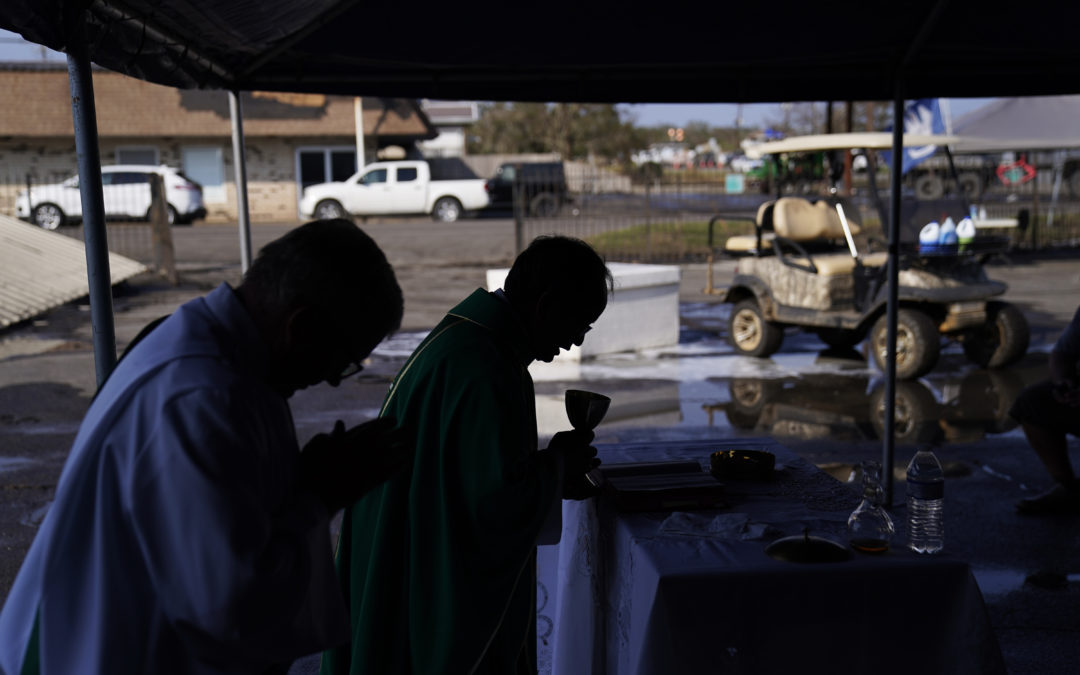
by Matt Sedensky and Aaron Morrison, Associated Press | Sep 14, 2021 | Headline News |
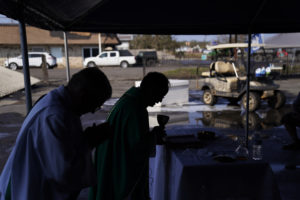
The Rev. Luke Nguyen, right, celebrates Mass in a flood damaged parking lot in the aftermath of Hurricane Ida, Sunday, Sept. 5, 2021, in Jean Lafitte, La. The service was held in a parking lot after St. Anthony Catholic Church was flooded in the hurricane. (AP Photo/John Locher)
MARRERO, La. (AP) — Amid the devastation caused by Hurricane Ida, there was at least one bright light Sunday: Parishioners found that electricity had been restored to their church outside of New Orleans, a small improvement as residents of Louisiana struggle to regain some aspects of normal life.
In Jefferson Parish, the Rev. G. Amaldoss expected to celebrate Mass at St. Joachim Catholic Church in the parking lot, which was dotted with downed limbs. But when he swung open the doors of the church early Sunday, the sanctuary was bathed in light. That made an indoor service possible.
“Divine intervention,” Amaldoss said, pressing his hands together and looking toward the sky.
A week after Hurricane Ida struck, many in Louisiana continue to face food, water and gas shortages as well as power outages while battling heat and humidity. The storm was blamed for at least 17 deaths in Louisiana, Mississippi and Alabama.
On Sunday, state health officials announced that the death toll in Louisiana has climbed to 13, including a 74-year-old man who died of heat during an extensive power outage. In the Northeast, Ida’s remnants dumped record-breaking rain and killed at least 50 people from Virginia to Connecticut.
As Mass began Sunday, Amaldoss walked down the aisle of the church in his green robe, with just eight people spread among the pews. Instead, the seats brimmed with boxes of donated toothpaste, shampoo and canned vegetables.
“For all the people whose lives are saved and all the people whose lives are lost, we pray for them,” he said. “Remember the brothers and sisters driven by the wind and the water.”
Through the wall of windows behind the altar, beyond the swamp abutting the church, the floodgates that saved the building could be seen. The Gospel was the story of Jesus bringing sight to a blind man, and throughout the tiny church, stories of miracles were repeated.
Wynonia Lazaro gave thanks for newly restored power in her home, where the only casualties of Ida were some downed trees and loosened shingles.
“We are extremely blessed,” she said.
Some parishioners suffered total losses of their homes, or devastating damage. Gina Caulfield, a 64-year-old retired teacher, has been hopping from relative to relative after her cousin’s trailer, where she’d been living, was left uninhabitable. Still, she was grateful to have survived the storm.
“It’s a comfort to know we have people praying for us,” she said.
Some parishes outside New Orleans were battered for hours by winds of 100 mph (160 kph) or more, and Ida damaged or destroyed more than 22,000 power poles, more than hurricanes Katrina, Zeta and Delta combined.
More than 630,000 homes and businesses remained without power Sunday across southeast Louisiana, according to the state Public Service Commission. At the peak, 902,000 customers had lost power.
Fully restoring electricity to some places in the state’s southeast could take until the end of the month, according Phillip May, president and CEO of Entergy, which provides power to New Orleans and other areas in the storm’s path.
Entergy is in the process of acquiring air boats and other equipment needed to get power crews into swampy and marshy regions. May said many grocery stores, pharmacies and other businesses are a high priority.
“We will continue to work until every last light is on,” he said during a briefing Sunday.
In Jean Lafitte, a small town of about 2,000 people, pools of water along the roadway were receding and some of the thick mud left behind was beginning to dry.

Shannon Lation checks on her home destroyed by Hurricane Ida, Sunday, Sept. 5, 2021, in Lafitte, La. (AP Photo/John Locher)
At St. Anthony Church, the 4 feet (about 1.2 meters) of water once inside had seeped away, but a slippery layer of muck remained. Outside, the faithful sat on folding metal chairs under a blue tent to celebrate Mass. Next door, at the Piggly Wiggly, military police in fatigues stood guard.
“In times such like these, we come together and we help one another,” the Rev. Luke Nguyen, the church’s pastor, told a few dozen congregants.
Ronny Dufrene, a 39-year-old oil field worker from Lafayette, returned to his hometown to help.
“People are taking pictures of where their houses used to be,” he said. “But this is a chance to get together and praise God for what we do have, and that’s each other.”
In New Orleans, many churches remained closed due to lingering power outages.
But First Grace United Methodist Church opened its doors and held service without power. Sunlight from large windows brightened the sanctuary, where about 10 people sat.
“Whatever situation you’re in, you get to choose how you see it,” said Pastor Shawn Anglim, whose first time pastoring the congregation was after the church recovered from Hurricane Katrina 16 years ago. “You can see it from a place of faith, a place of hope and a place of love, and a place of possibility.”
Jennifer Moss, who attended service with her husband, Tom, said power had been restored to their home on Saturday.
“We’ve been blessed throughout this entire ordeal,” she said. “That storm could have been a little closer to the east, and we wouldn’t have a place to come and worship.”
In Lafitte, about 28 miles (45 kilometers) south of New Orleans, animal control officer Koby Bellanger experienced his own little blessing after he heard the sounds of an animal crying as he rode through the flooded streets with a sheriff’s deputy.
Bellanger waded through the water and found a tiny, green-eyed black kitten clinging to the engine of a car outside a devastated house. He hoisted the animal up, to the delight of Lafayette Parish Deputy Rebecca Bobzin.
“Bring him!” Bobzin screamed in delight.
Louisiana’s 13 storm-related deaths included five nursing home residents evacuated ahead of the hurricane along with hundreds of other seniors to a warehouse in Louisiana, where health officials said conditions became unsafe. On Saturday, State Health Officer Dr. Joseph Kanter ordered the immediate closure of the seven nursing facilities that sent residents to the warehouse.
Edwards was briefed Sunday about a cluster of thunderstorms near Mexico’s Yucatan Peninsula, but said forecasters “don’t see much potential at all for it developing into a storm of any real significance and we’re very, very thankful for that.”
He said it does have the potential to bring some rain to coastal Louisiana and southeast Louisiana.
___
Morrison reported from New Orleans. Associated Press writer Denise Lavoie in Richmond, Virginia, contributed.
by T-Kea Blackman | Sep 9, 2021 | Headline News |
Video Courtesy of AJ+
“Black people don’t commit suicide. That’s a white thing.”
Who said that? That is a false statement. Blacks suffer from mental illness just like their white counterparts. In fact, when you think of everyday stressors, systematic-racism such as police brutality, education and health care gaps, and sexism that impacts black women, blacks are more likely to be at risk for developing a mental condition.
Although July is Minority Mental Health Awareness Month, this week, September 5-11 is National Suicide Prevention Week and it is a perfect time to shed light on what many deem a nonexistent problem. Schizophrenia, post-traumatic stress disorder, bipolar disorder, major depression, generalized anxiety disorder, dissociative identity disorder/multiple personality disorder, bulimia, ADHD, OCD and social anxiety are examples of mental illnesses that people battle daily. In the black community, many choose not to acknowledge mental illness as a sickness. Diseases such as diabetes and cancer are accepted as normal and natural, but what so many fail to realize is that blacks are no different than any other race when it comes to these illnesses. We are not exempt from mental illness.
While some experience mental illness only once in their life (depending on the illness, environment, life stressors, and genetics), others battle mental illness for the rest of their lives. Some of us think that we do not have a problem and truly believe that everyone else is the issue. Unfortunately, these myths and illusions force us to suffer in silence and not seek treatment. Mental illness affects “everyday functional” people and it is not limited to the homeless man talking to himself. It impacts a person’s emotions, perception, and behaviors.
As a person with major depression and generalized anxiety disorders, the comments said to me have been heartbreaking and mind-blowing because it prevented me from seeking help. I thought that I was making it up in my head even though I didn’t feel well for years. Finally diagnosed at 25, my doctor stated that the illness started around the age of 13. Can you imagine having cancer without being diagnosed for over 10 years? You would die. Well, I can tell you that I was dying on the inside and it led to multiple suicide attempts. My illness can get so debilitating. At one point, it stopped me from doing basic things such as going to work, talking, eating and showering.
Here are some of the myths that we must stop saying!
Myth #1: Only white people commit suicide.
Fact: According to by the Centers for Disease Control and Prevention, the suicide rate of black children in between the ages of 5 and 11 doubled between 1993 and 2013 and the rate among white children committing suicide declined. Suicides by hanging nearly tripled among black boys. While whites still have highest suicide rates in the country, suicide rates among black youth have significantly grown over the past decade. Unfortunately, black youth are killing themselves more frequently than their elders. Suicide has become the third leading cause of death among black people between the ages of 15 and 24 and a leading cause of death among school-aged children younger than 12 years in the United States.
Myth #2: Medication doesn’t work and/or they make you feel worse.
Fact: Medication is necessary for some individuals in their mental recovery. While they are NOT cures for mental illness, they are vital for treating the symptoms. Some may need medication for the rest of their lives (depending on the illness) and others only need it for a specific time. Nonetheless, medication is not a sign of weakness and it does not mean the person is crazy. It is no different from taking medication for high blood pressure or insulin for diabetes. Just like the body gets sick, the brain gets sick too, if you don’t take care of it. And no, this is not to say that everyone with a mental illness will need medication, but it is an invaluable help to many.
Myth #3: Black people don’t go to therapy.
Fact: Though there has been a deep-rooted stigma about seeking therapy, Blacks are increasingly seeking therapy for mental illness. Therapy is great whether you have a mental illness or not. Therapy helps you to work on yourself, dissect problems, face fears and overcome obstacles such as breakups, loss of a loved one, financial challenges, self-image issues, abuse, etc. As mentioned previously, blacks deal with oppression daily and therapy can help us work through it. Those who are still hesitant to try therapy can look into other ways of getting help. The support of a life coach has also been shown to be beneficial for many.
Myth #4: You can pray it away.
Fact: As a Christian, I have seen God perform miracles in my life. But when you say to a person “just pray,” you are assuming that they are not praying and dismissing how they feel, challenging the sincerity of their faith, and most likely preventing them from getting treatment. You would not say “just pray” to a person who broke a leg. You would tell them to go to the doctor for an x-ray and cast. We must treat mental illness the same. God also gives us resources to use on earth and sometimes that may be therapy and medication when a person is battling a mental illness.
Damian Waters is a marriage and family therapist in Upper Marlboro, MD, where he serves predominantly African American clients. On the issue of the stigma surrounding blacks seeking therapy, he says, “There’s some shame and embarrassment. You’ll tell someone that you went to the doctor, but you won’t tell that you went to the counselor or psychiatrist. Also, there is the idea that their faith should carry them through, though often their problems are larger than that.”
As a way to honor those with mental illness, please think before you speak, and encourage those who need help to seek treatment. Mental illness is just as serious as any other disease and those affected by it should not be judged or outcast. Mental illness is a flaw in brain chemistry, not a character flaw, or a white people problem.
Can you think of other myths surrounding Blacks and mental illness? Share them below along with your thoughts on putting the myths to rest once and for all.
by Meg Kinnard and Denise Lavoie, Associated Press | Aug 26, 2021 | Headline News |
RICHMOND, Va. (AP) — A federal appeals court on Wednesday upheld the conviction and sentence of a man on federal death row for the 2015 racist slayings of nine members of a Black South Carolina congregation.
A three-judge panel of the 4th U.S. Circuit Court of Appeals in Richmond affirmed Dylann Roof’s conviction and sentence in the shootings at Mother Emanuel AME Church in Charleston.
In 2017, Roof became the first person in the U.S. sentenced to death for a federal hate crime. Authorities have said Roof opened fire during the closing prayer of a Bible study at the church, raining down dozens of bullets on those assembled. He was 21 at the time.
In his appeal, Roof’s attorneys argued that he was wrongly allowed to represent himself during sentencing, a critical phase of his trial. Roof successfully prevented jurors from hearing evidence about his mental health, “under the delusion,” his attorneys argued, that “he would be rescued from prison by white-nationalists — but only, bizarrely, if he kept his mental-impairments out of the public record.”
Roof’s lawyers said his convictions and death sentence should be vacated or his case should be sent back to court for a “proper competency evaluation.”
The 4th Circuit found that the trial judge did not commit an error when he found Roof was competent to stand trial and issued a scathing rebuke of Roof’s crimes.
“Dylann Roof murdered African Americans at their church, during their Bible-study and worship. They had welcomed him. He slaughtered them. He did so with the express intent of terrorizing not just his immediate victims at the historically important Mother Emanuel Church, but as many similar people as would hear of the mass murder,” the panel wrote in is ruling.
“No cold record or careful parsing of statutes and precedents can capture the full horror of what Roof did. His crimes qualify him for the harshest penalty that a just society can impose,” the judges wrote.
One of Roof’s attorneys, Margaret Alice-Anne Farrand, a deputy federal public defender, declined to comment on the ruling.
All of the judges in the 4th U.S. Circuit Court of Appeals, which covers South Carolina, recused themselves from hearing Roof’s appeal; one of their own, Judge Jay Richardson, prosecuted Roof’s case as an assistant U.S. Attorney. The panel that heard arguments in May and issued the ruling on Wednesday was comprised of judges from several other appellate circuits.
Following his federal trial, Roof was given nine consecutive life sentences after pleading guilty in 2017 to state murder charges, leaving him to await execution in a federal prison and sparing his victims and their families the burden of a second trial.
President Joe Biden as a candidate said he’d work to end federal executions. White House press secretary Jen Psaki said in March that he continues to have “grave concerns” about it.
Biden has connections to the case. As vice president, Biden attended the funeral for one of those slain, state Sen. Clementa Pinckney, who also pastored the congregation. During his 2020 presidential campaign, Biden frequently referenced the shooting, saying that a visit to Mother Emanuel helped him heal in the aftermath of the death of his son, Beau.
Roof’s attorneys could ask the full 4th Circuit to reconsider the panel’s ruling. If unsuccessful in his direct appeal, Roof could file what’s known as a 2255 appeal, or a request that the trial court review the constitutionality of his conviction and sentence. He could also petition the U.S. Supreme Court or seek a presidential pardon
___
Kinnard reported from Houston.
 Briefly, the story goes like this: a man has three people that work for him. (We can call them servants or employees.) He leaves them five talents, two talents, and one talent, respectively, while he travels to another country. (A talent could be interpreted as a way of making money or money itself. For this, let’s just say a talent is worth $10,000.) When he comes back after a long time, the first employee now has ten talents ($100,000), the second has four talents ($40,000), and the last one gives his talent ($10,000) back to his employer. The employer rewards the two servants that made him money, but calls the other one wicked and “cast[s] the unprofitable servant into outer darkness” where it says there’ll be “weeping and gnashing of teeth” (Matthew 25:30, KJV). Yeah… he sends the unprofitable “wicked” servant to (symbolic) hell.
Briefly, the story goes like this: a man has three people that work for him. (We can call them servants or employees.) He leaves them five talents, two talents, and one talent, respectively, while he travels to another country. (A talent could be interpreted as a way of making money or money itself. For this, let’s just say a talent is worth $10,000.) When he comes back after a long time, the first employee now has ten talents ($100,000), the second has four talents ($40,000), and the last one gives his talent ($10,000) back to his employer. The employer rewards the two servants that made him money, but calls the other one wicked and “cast[s] the unprofitable servant into outer darkness” where it says there’ll be “weeping and gnashing of teeth” (Matthew 25:30, KJV). Yeah… he sends the unprofitable “wicked” servant to (symbolic) hell.





